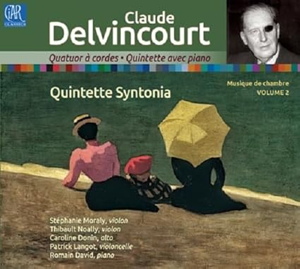
Claude Delvincourt (1888-1954)
Chamber Music Volume 2
String Quartet (1954)
Quintet for Piano and Strings (1908)
Quintette Syntonia
rec. 2022, Auditorium Marcel Landowski, Paris
Ciar Classics CC016 [63]
This is the second volume of chamber music released by Ciar Classics in their Claude Delvincourt series. I had the pleasure of reviewing Volume 1 back in 2016.
Claude Delvincourt isn’t a household name, so a little background will be helpful. He was born in Paris in 1888. His early musical studies were with Leon Boëllmann and Henri Büsser. He later attended the Paris Conservatoire under the tutelage of Georges Caussade and Charles-Marie Widor. His father had hoped he would follow him into the diplomatic service once he had completed his law degree, but Claude had other ideas. In 1913 he won the Première Grand Prix de Rome, and this determined the musical path he would take for the rest of his life. A short spell in the voluntary infantry at the outbreak of World War 1 was curtailed through injury; he bore the scars for the rest of his life. From 1932 he held conservatory posts in Versailles and Paris; he remained at the latter until his death. During the German Occupation in the 1940s, he helped protect his students from service in Germany. He formed the Orchestre des Cadets du Conservatoire. He hid many illegal students, and he himself joined the resistance movement, the ‘Front National des Musiciens’. He ended up having to hide himself towards the end of hostilities at a Jewish friend’s house. He died in Italy April 1954 as the result of a car accident.
The earliest work here is the Quintet for Piano and Strings, a youthful work penned between October and December 1908 when the composer was only twenty. It’s cast in four movements, and this is its World Premiere Recording. One thing that struck me from the very opening bars is that the piano part is very virtuoisic. The first movement has moments of impetuousness and blazing fervour. It very much narrates a young man’s passion. Yet there are contrasting moments of dancing delicacy. This leads to a lively, bouncing Vivace scherzando. It feels like the dreamlike slow movement is the emotional heart of the work, and the Quintette Syntonia lavish it with much warmth and tenderness. The finale feels like it’s pawing at the ground, and one can discern the galloping of hooves.
Written at the end of his life, the String Quartet is a very different kettle of fish. Delvincourt wrote it for the Parrenin Quartet, who premiered it in Rome in 1954 and went on to make a recording of it in 1956. Sadly, the composer was on his way to the premiere on 5 April 1954 when he was was killed in a car accident. It was published posthumously. It displays a more mature and advanced compositional style than the early Quintet. The opener is restless and unsettled, with the writing angular and discordant. A swirling Presto follows, busy and nervous. There’s a feeling of solitary isolation in the slow movement, with echoes of Bartók’s Night music, in its haunting and nocturnal strains. The final movement is energetic and lively, with all the players kept fully engaged.
These two delightful and contrasting scores benefit from committed performances from the wonderful Quintette Syntonia. Booklet notes supply the required background.
Stephen Greenbank
Availability: Ciar ClassicsPrevious review: Jonathan Woolf (November 2024)


















